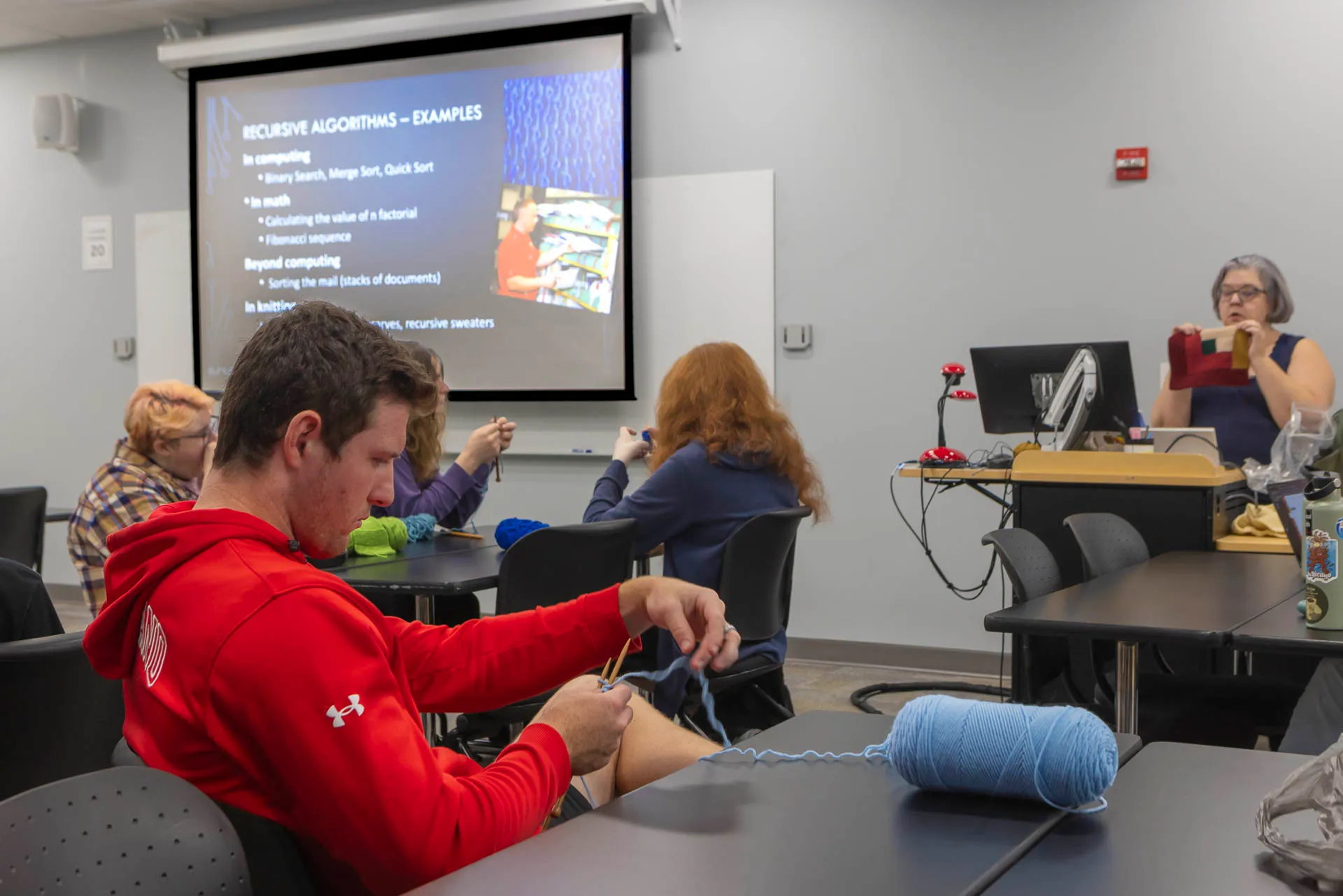- October 23, 2025
- By Karen Shih ’09
The steady clickity-clack of knitting needles greeted students who slipped into a classroom where colorful yarn trailed across tables. Would the lecturer talk about costume design? Marketing for fashion brands? The benefits of tactile activities for mental health?
None of the above. Instead, College of Information Lecturer Pamela Duffy launched into slides about recursion, an essential computer science concept.
“Knitting is very mathematical and very pattern-based, so it’s a way to introduce algorithms that doesn’t feel threatening and actually feels fun,” said Duffy, who has taught “Knitting = Algorithms + Coding” for several years. “And everyone walks out of the course with something they’ve created when they’re done.”
It’s one of nearly a dozen one-credit Maker Movement Approach to Computing (MMAC) classes at the University of Maryland that use students’ personal interests as a low-stakes on-ramp to learn about technology. Spearheaded by INFO Associate Dean for Strategic Initiatives Katherine Izsak, the project-based courses have expanded this year.
“We want to share the skills taught in an information school with any student on campus who wants to experience them,” Izsak said.
Several classes examine artificial intelligence, including Izsak’s “Human-AI Fiction Co-Writing,” in which students experiment with how tools like Sudowrite can be used for creative writing, and Professor Jen Golbeck’s “Social Media Feed Algorithms,” which demystifies how companies use AI to curate their addictive feeds.
“My goal is to teach them to use AI ethically, to be doing their own work while using AI as a brainstorming or collaborative tool,” said Izsak.
Others are more interactive, such as Senior Lecturer Dennis Frezzo’s “Electronics for Makers,” where students learn introductory programming and build small devices. “It’s meant to be very accessible and basic. Anybody, no matter what their background, can make circuits.”
The courses run for half a semester, and some are online and asynchronous, making them easy to fit into a schedule or to double up. INFO plans to have at least six per semester going forward.

Bryce McFerson ‘26 knits while Lecturer Pamela Duffy explains algorithms to the class.
In the knitting class, Felix Baum ’29, a computer science and linguistics double major in College Park Scholars’ Data Justice program, said, “The hands-on part is big. As a CS major, everything is data structures this and data structures that. You can think about it, you can work with it on a computer, but you can’t touch it. Here I’m touching it, dropping stitches, picking stitches back up. It’s very interesting.”
Doing physical debugging on his knitting project was eye-opening and was teaching him patience, said information science major Joseph Lavezzo ’29. He liked Duffy’s examples of where algorithms could be found in the wild, from patterns in nature to packing to return to campus.
Terps troubleshooted with each other as they worked on their final projects: a covering for a brick doorstop and a laptop sleeve, respectively.
As the MMAC offerings expand, the Izsak and her team hope more students from different majors sign up.
“One of the most brilliant software engineers I worked with was a music major. Music comes back to the same patterns that math and computer programming does,” said Duffy. “Frequently, students who could be really great assets to the STEM field don’t think they’re worthy of taking up space in those places. If we can open up these areas, we have the potential to create better answers.”
AI at Maryland
The University of Maryland is shaping the future of artificial intelligence by forging solutions to the world’s most pressing issues through collaborative research, training the leaders of an AI-infused workforce and applying AI to strengthen our economy and communities.
Read more about how UMD embraces AI’s potential for the public good—without losing sight of the human values that power it.
Topics
Campus & CommunityUnits
College of Information